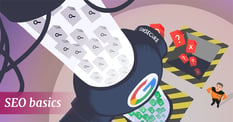Google Penguin explained
When you hear the word ‘Penguin’, you probably don’t think about Google. But Google Penguin was a very important update that had a big impact on search. What does Penguin do, and how to you deal with it? Watch the video and read on!
What is Google Penguin?
One of the most painful Google updates that can hit a website is called Penguin. Google Penguin aims to remove sites from the search results that have been trying to game Google by buying or otherwise “unnaturally acquiring” links to their website. It does that by basically applying a negative value to specific links. So if you have certain links, your rankings will become lower, not higher.
“Luckily”, if a site is hit by Google Penguin, 9 times out of 10, the owner has been gaming the search engine and could have seen it coming. Most of the sites hit by Google Penguin have bought links from so called link networks, or “private blog networks” or whatever name you want to give it.
Getting rid of Google Penguin
If you’ve been hit by Google Penguin you probably need help. You’ll need to identify which links are bad and either have those links removed or “disavow” those links. Disavowing links is something you can do through Google’s disavow tool. It allows you to upload a file with URLs and domains that you have links from, saying: “I don’t want these links to count”. The file has to be in a specific format, explained here.
We have written about this before, this post goes into more detail about cleaning up bad backlinks.
Google Penguin and Negative SEO
There’s one very nasty side effect of Google Penguin, one that’s usually not talked about by Google but I’ve seen to be very real. Because certain links have a negative value, you can use them negatively. You can buy links towards your competitor and have them be hit by Penguin. This is not easily done, but it does happen and it can be very bad for business if it does.
Several services out there can look at your backlink profile and can help you do pro-active disavowing, we personally like both LinkResearchTools and Kerboo. This, luckily, isn’t needed in most niches, but in some of the more aggressive niches it might be something you need.
Google Penguin real-time
In the video, I still speak about Penguin running “every once in a while”. Since its release, the Penguin update ran several times, and Google added it to the core algorithm in 2016.
Conclusion
You shouldn’t buy links. Ever. The risk is just too big. Google Penguin has made very sure of that. There are some negative side effects to Google Penguin that most people won’t have to worry about but if they affect you, they can be very painful.
The basic idea about links is simple: if you can buy a link, it’s not worth anything and in general should be considered a risk. Links have to be earned, through good PR, cool tools, nice marketing, etc. We have a couple of nice posts about link building, so start reading those!




Discussion (9)